How selling horse meat was made possible whilst it was considered a taboo food until the 19th century?
When discovering the French capital, you may have encountered a few shops called ‘boucheries chevalines’. They are no more, no less traditional horse meat butcher shops.
If eating horse meat (ie. hippophagy) is common in France, this has not always been the case. Far from it.
Let’s take a closer look at this tradition, which questions and even disgusts many people today, especially in the Anglo-Saxon world.
Changing the mindsets about eating horse meat

Since the Ancient Times, horses have been associated as companions at work and/or of war. Eating horse meat was inconceivable and forbidden by the church and by law. But the mindsets of the French started to change in the 19th century.
During the French Revolution and the Napoleonic Wars, horse meat was served to the lower classes and starving soldiers at war.
In 1825, a member of the Health Committee of the Préfecture de Police was convinced that horse meat was useful to feed prisoners and the poor.
Then, in 1847, French zoologist Isidore Geoffroy-Saint-Hilaire declared that eating horse meat (ie. hippophagy) was good for human consumption. More and more influential people became devoted to the cause of legalising the sale of horse meat.
They organised banquets with the goal to change mindsets and popularising horse meat. These events tried to make horse meat part of the culinary traditions of France. In support of their arguments, they presented horse meat as slightly sweet, tender and low in fat. Needless to say, they faced opposition: ordinary butchers selling pork and beef. They felt threatened by this unfair competition. Indeed, the price of beef meat was twice as high as horse meat.
1866: the first Paris horse meat butcher shops opened
In 1866 the French government passed a law authorising the selling of horse meat for human consumption.
With the high cost of living, many Parisians from the working class were too poor to buy pork or beef. The first Paris horse meat butcher shop opened on 9 July 1866. A horse meat butcher shop had already opened in Nancy on 15 June 1866, being the first in France.
However, there were many conditions attached to the new law. Sales had to be seriously supervised: veterinary controls were strictly followed.
And the stores had to be clearly identified. This is why up until today, Paris’ horse meat butcher shops are not to be confused with ordinary boucheries (butcheries). You will find in Paris the signage elements of horse meat butcher shops with a horse head surrounded by neon tubes.
Horse meat butcher shops in Paris
1bis rue Cadet in the 9th arrondissement of Paris
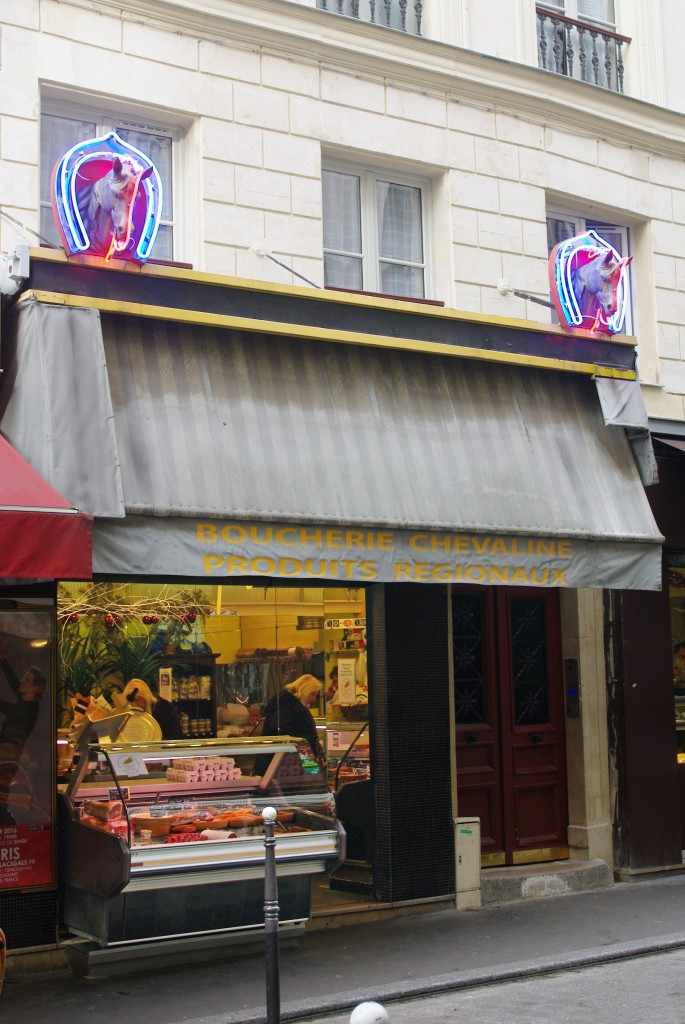
3 rue Poncelet in the 17th arrondissement of Paris
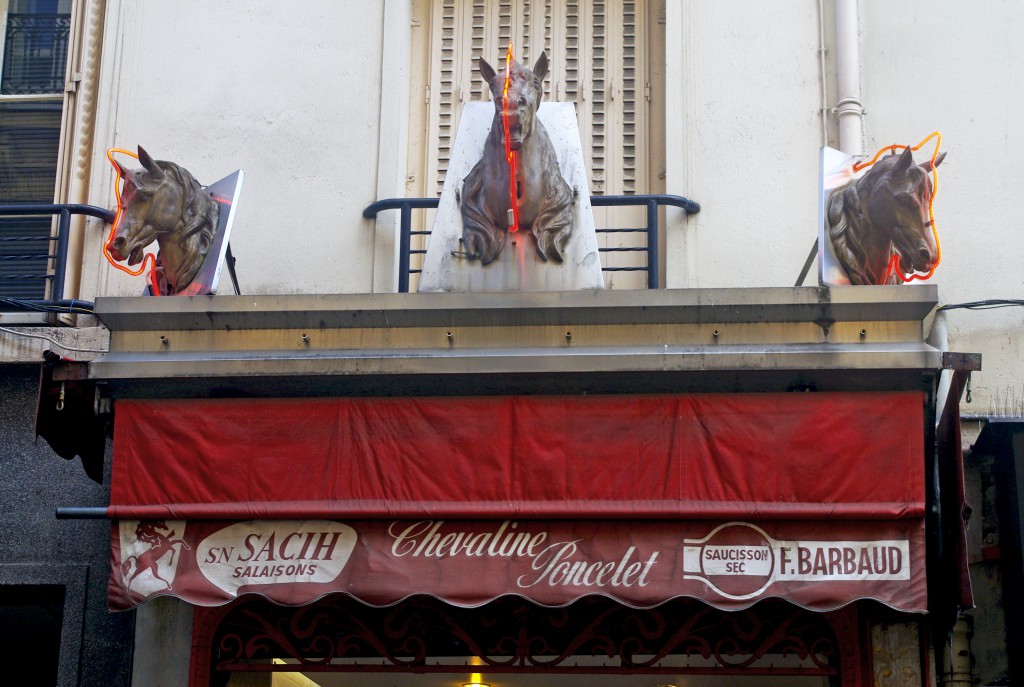
Corner of rue Vieille-du-Temple and rue du Roi-de-Sicile in the 4th arrondissement
The bright-red storefront of a former horse meat butcher shop.
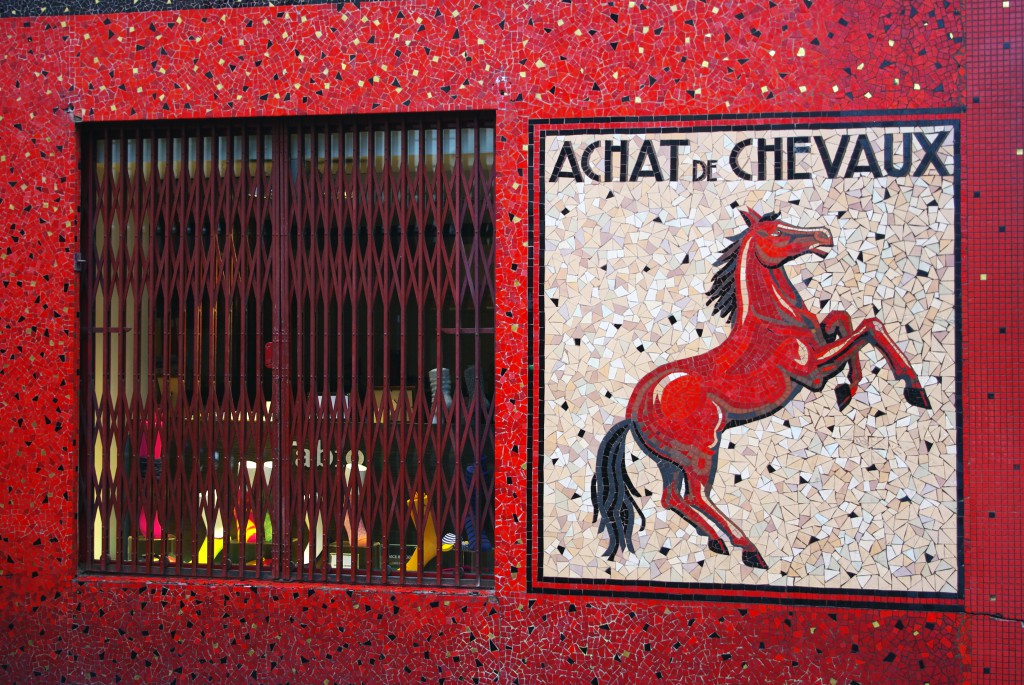
Other horse meat butcher shops in Paris:
Typical shops with one or several horse head(s) above the red awning:
- 9 rue des Petits-Carreaux in the 1st arrondissement
- 72 rue Montorgueil in the 2nd arrondissement
- 7 rue Jeanne d’Arc in the 13th arrondissement
- 10bis rue Daguerre in the 14th arrondissement
- 89 rue Cambronne in the 15th arrondissement
- 7 rue du Poteau in the 18th arrondissement
- 14 rue des Gâtines in the 20th arrondissement
And also a former shop at 7 rue Fizeau in the 15th arrondissement (mosaics representing a horse head)
From Franco-Prussian War up until today
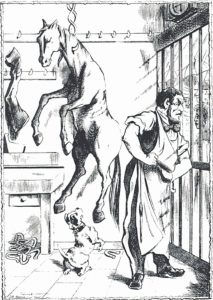
After the legalisation of horse meat consumption, it took a little while for the population to accept it in its cuisine. The Franco-Prussian War contributed to changing mindsets. During the Siege of Paris (1870-71) the French capital went through a shortage of fresh meat. The starved Parisians were given horse meat to eat. By the end of the war, the meat had finally become popular.
In 1905 there was 311 horse meat butcher shops in Paris and 200 market stalls. Since the 1950s, the consumption of horse meat has gradually decreased in France. Only horse meat butcher shops (boucheries chevalines) were allowed to sell horse meat. In the 1990s, the law made this more flexible and it is now possible to find horse meat in French supermarkets and other shops.
Horse meat production and taboos
Against all odds, the French are not the only people in the world who eat horse meat.
Statistics from 2009 show that horse meat production was as follows:
- 7500 tonnes in France
- 18,000 t in Canada
- 21,000 t in Brazil
- 24,000 t in Australia
- 57,000 t in Argentina
- 78,000 t in Mexico
In the Anglo-Saxon world (United Kingdom, Ireland, United States, part of English-speaking Canada and Australia), the population is refusing to eat horsemeat, including in pet food.
In France, there have been anti-hippophagy campaigns for several years. The most famous of these movements is that of the Brigitte-Bardot Foundation, whose slogan is:
“Non, un cheval ça ne se mange pas” (No, you can’t eat a horse).
Do you think it’s a good or a bad thing to sell horses as meat? Leave a comment below and let us know!

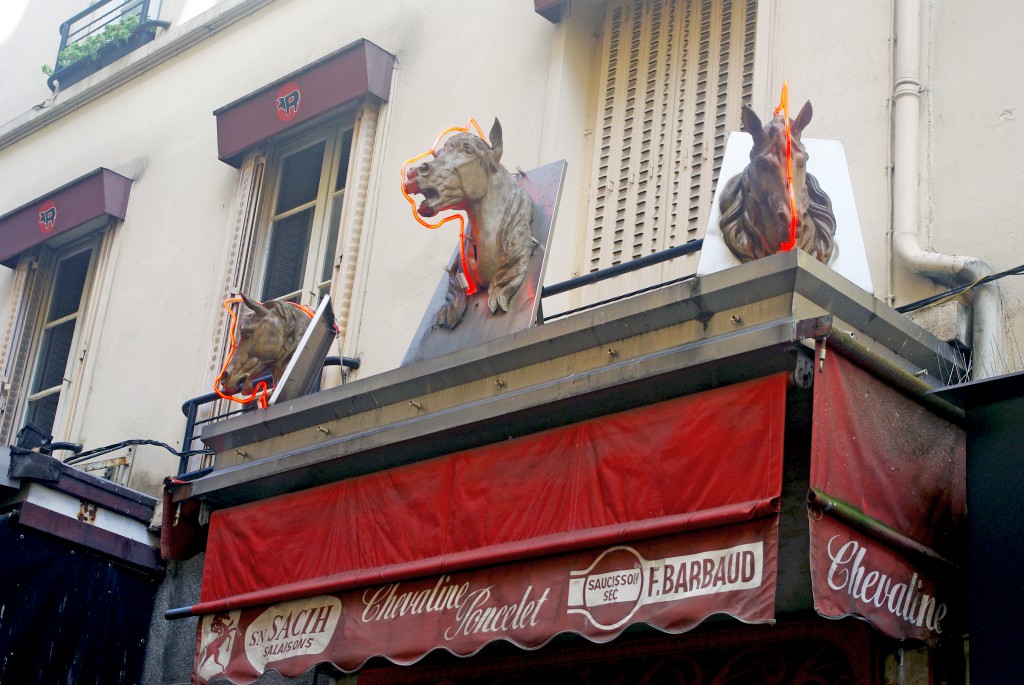
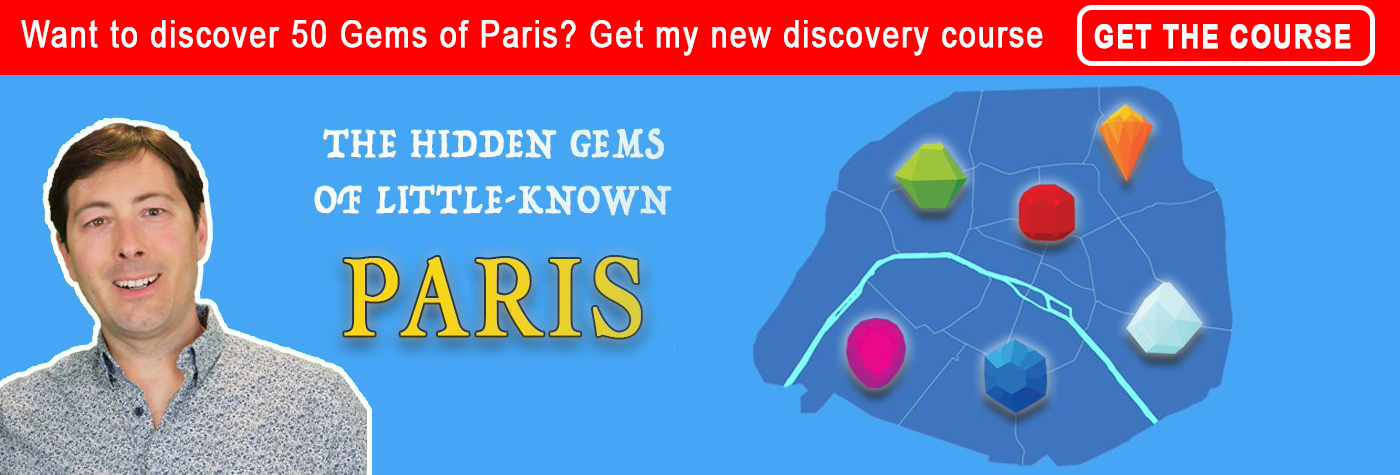

For Paris to be such a progressive and refined area of Europe (and the world), I find the accepted practice of horse meat consumption to be abhorrent. To each their own, but the information contained in this post left me seriously disturbed. I had no idea this was a common and acceptable practice in highly civilized nations…. so sad!
Nice blog! I really appreciate your post about Changing the mindsets about eating horse meat. Keeping horses is our responsibility. I hope we treat our horses with proper acre and love.
Thank you for your comment! ??
I would like French horse meat eaters to know that France imports Australian horse meat that is full of drugs dangerous to human health. I am a horse owner who regularly gives a drug called Phenylbutazone to my horses. All Australian horses are given this drug at some time. The EU does not allow this drug into the food chain yet Australia exports horse meat full of it.
Oh dear, people are so precious… horse meet is sold in many countries! I wasn’t looking for it but in particular I remember it in the market in Venice and in many Sicilian towns.
I love cows (so gentle) and pigs too (so funny and intelligent) – oh not to mention sweet little lambs. I wonder why people think it’s ok to eat them but not horses. If people choose to be vegan that’s great! but to eat some animals and blame people for eating others seems strange to me
That’s a good point Kathryn! 🙂
NO, NO, NO.
Stop eating horse meat, PLEASE.
To reassure you I’m not eating horse meat… at least I haven’t for a very long time!! 🙂
No…to horse meat. Period.
Isn’t it pretty much only the older generation in France who now eats horse meat? The practice may (hopefully) be on its way out.
Here is a website that will inform all the European horse meat eaters about the drugs and chemicals they are eating. Plus they might also like to see the cruelty involved before they take their next mouthful of horse meat. https://meetourhorsemeat.com/toxic-horsemeat/
Thanks for posting the link. It’s shocking to me that eating horses is even going on at all. They are such beautiful and magnificent creatures. We need more animal sanctuaries and less killing.
Thanks for the link Dominic!
Eating horse meat is as unappealing to me as eating dog meat so if I saw a shop like those your photographs proudly declaring that they sell horse meat then I would almost certainly get negative thoughts about the concept and to a lesser extent the country in general. I also find the thought of eating lambs or young goats unappealing.
I find it repulsive to eat any type of animals. Horses are such beautiful animals.
You might as well say it’s OK to eat domestic animals – like they do at the Yulin festival in many Asian countries.
I’m vegan now but if you ear meat of one kind then how does it matter what anjmal is killed? I’m vegan because I don’t want to see animals killed for any reason other than self-defence, because of the large impact the animals for food has on our air and feesh water and it is healthier to reduce meat consumption ir eliminate it. Having said all that there are different cultural approaches to eating different animals. One person’s pet is another’s dinner. I’m uncomfortable with butchering horses and dogs ( China) because of my Canadian background. I would like all killing of animals to end as often it creates so much cruelty.
Typical alarmist! Trying to scare people from eating horse meat. I’m sure the EU would have made sure that the drug you describe would not be in meat imported into Europe. Donald Trump uses scare tactics to get people to do his bidding!
Thank God I am a vegetarian! It would be completely horrific to be served horsemeat! Horses are well above mankind in terms of intelligence, humility, loyalty and nobility. Same with pigs, sheep, goats and fowl. Humans are just scum.
I don’t have a problem with it. They are farm animals.